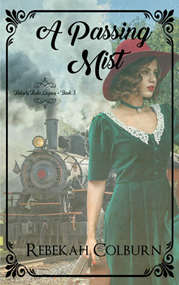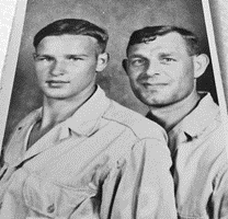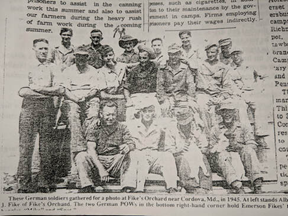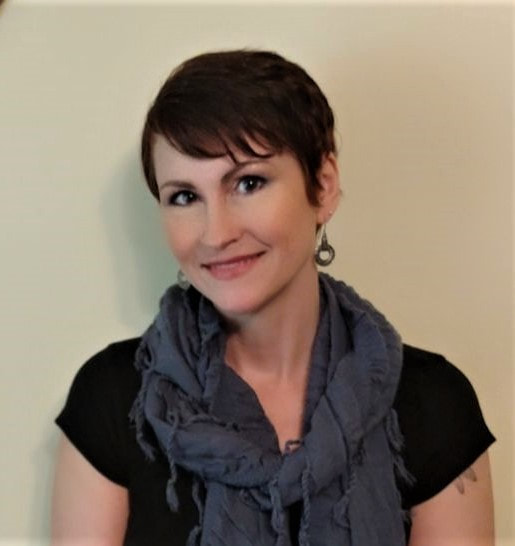
When the U.S. enters WW2, Gloria joins the Women’s Army Auxiliary Corps in hopes of adventure. Her escape is short-lived, however, and duty calls her back to the family farm—but returning to Ridgely means facing memories she’d rather leave behind.
As she struggles to make peace with her past, a new challenge arises. German POWs are hired to help work the farm... Gloria never imagined she would find love again, and certainly not with a man on the wrong side of the war.
Having already thrown off feminine stereotypes, Gloria is used to facing criticism. But a romantic relationship with a “Nazi soldier”—regardless of his true affiliation—is more than unacceptable, it’s dangerous. In a world torn by war and hate, how can they hope to build a future together?
Combining history and fiction is always fun, but writing this novel was particularly enjoyable for me! There were a lot more historical details to work with on a local level, thanks to the newspaper articles and interviews with senior Ridgely residents recorded in Rampmeyer’s historical booklets. I also tied in some elements of personal interest to me, such as a woman’s role in society and the identification of verbal and emotional abuse as domestic violence.
This time period is often studied for a variety of reasons, one of which is our fascination with the arch-villain, Adolph Hitler. And a forbidden romance always adds a little bit of excitement. When I learned that there had been German Prisoner of War Camps on the Eastern Shore, and in Caroline County, I knew I had the basis for a great story!
As our hometown boys either enlisted or were drafted, it created a shortage of hands to work the local farms and canneries. The Department of Agriculture decided that the German POWs were the solution to this problem. Rather than merely taking up space waiting for the war to end and placing additional needs on the government to provide for them, the POW’s could make themselves useful and earn wages to pay for their keep. They were bussed out daily to farms and canneries throughout the area, many of the prisoners developing friendships with the locals they came to know.
| One such German was Herbert Richard Stoerzer, (on the left in the accompany photo) who was held in Cambridge and worked at the Phillips Packing Company. In an article in the Dorchester Banner, his son Karl said, “He was, ‘a young, innocent, naïve kid getting drafted into the Wehrmacht, along with many other poor young men, all through no fault of their own… I do remember a story he told about some of the longer-term POWs in Cambridge who were more ideologists than the younger newly arrived. This group, to the dismay of the new arrivals, still believed that Germany would win the war, and would try to paint a swastika on the water tower. Of course, the new POWs disavowed themselves from this group.” |
| Annice Ebling Fike wrote her memories of the POW experience (taken from the Caroline Sun Historical Booklets, Vol. 8). “It was the late years of World War II that our apple orchard near Cordova was having a big problem to secure workers to pick apples. It was my husband (Norman Fike) that read an ad in the local newspaper about German prisoners being available to help with farm work. The next day Norman contacted the man in charge of the prisoners for the rules and requirements, which he readily agreed to. On Monday morning, early, my husband drove our farm truck to the old Easton airport to collect the prisoners. He was allowed 20 POWs. |
One of the youngest prisoners became a friend with my husband's brother, who was 18. The prisoner was 16 years old, his name was Franz Krautcreamer. He was intelligent and learned to speak English quickly. The first time he came in our house, tears came in his eyes when he saw our piano. His family had a piano before the war. We asked Franz to sit down and play our piano, within minutes we knew he was good at playing the piano.
In November of 1945 the German prisoners were pulled out of this country and returned to their homeland. Our family was sorry to see them leave because they had become more than just workers. They had become our family friends, most had picked up enough English to make good conversation.
In the months after the POWs had left this country, we continued to receive mail from many of the group who had worked at our orchard. The oldest person in the group was in his forties, wrote to tell of his marriage. The next year when he wrote, his wife had a baby boy and he named him "Norman" because of the kindness our family in war time had shown him.
My greatest surprise of the prisoners came many years later, as we had kept in contact with our 16 year old Franz. He had went to college, then married and had a large family and became a wealthy business man, due to a navigation invention he had made.
It was an afternoon in 1970 when a Washington taxi stopped at our back door and a man carrying an armful of flowers knocked on our back door. I opened the door and recognized Franz Krautcreamer. We hugged and both did cry. He had planned this stop because we were the American friends who had smiled and showed kindness to a scared 16 year old boy imprisoned in a foreign country in war time, this he never forgot.b v We all had dinner, including the taxi cab driver, and talked for hours. Franz then had to leave to catch the plane to Florida, where he was opening a business office. He made us promise to visit him in Germany. His family had grown to eight children.
We did visit Franz in Germany. His home was a 16-room restored castle on the Rhine River! We got a deluxe tour of Germany and it was a such an enjoyable trip, we later made a second trip to visit the Krautcreamer family. All because of giving a helping hand to a stranger in war time, our family made good friends with a German family twenty years later.”
My own Franz is a composite character inspired by these two stories. As Gloria comes to terms with her failed marriage with a local who still works at the Breyer’s Condensing Plant where she must help her father deliver milk from their dairy cows, you glimpse a picture of Ridgely in the 1940s. There was even an observation post where men, and eventually women too, took turns watching the skies and documenting every aircraft that flew over. They practiced blackouts, darkening all the windows whenever the siren was heard.
Gloria’s mother, Sophie, had endured the Great War and her life had been dramatically shaped by its events. Now, Gloria must face the challenges of her own day, far more complex as the “enemy” shooting at her brother overseas is also working shoulder to shoulder with her on the family farm.
Often remembering the words of her grandmother, Ella Mae, Gloria chooses to forge a path true to her own independent spirit. She even takes a job at the Feed Store, owned by Martin Sutton (after whom the Ridgely Park is named), hoisting heavy sacks of grain over her shoulder in her denim overalls. Gloria knows that Franz is more than just a good looking, exciting diversion, and she believes their love is worth taking whatever risks are required.
Although the Ridgely Rails Legacy ends with this novel, the story of Gloria’s family continues in the next series with her niece, Natalie, in the Time Returns Series, set in the town of Greensboro, Maryland.
For more information on how to purchase my novels, or to learn more about my other series, you can go to my website, RebekahColburn.com. You can also view my blog articles between April and July of 2019 for more details about the Ridgely Observation Tower, Breyer’s Condensing Plant, and German Prisoners of War on the Eastern Shore.
If you would like to read my article, A BIBLICAL PERSPECTIVE ON ABUSE, MARRIAGE, AND DIVORCE, it is found in my blog archives, dated 6/25/2019.



 RSS Feed
RSS Feed